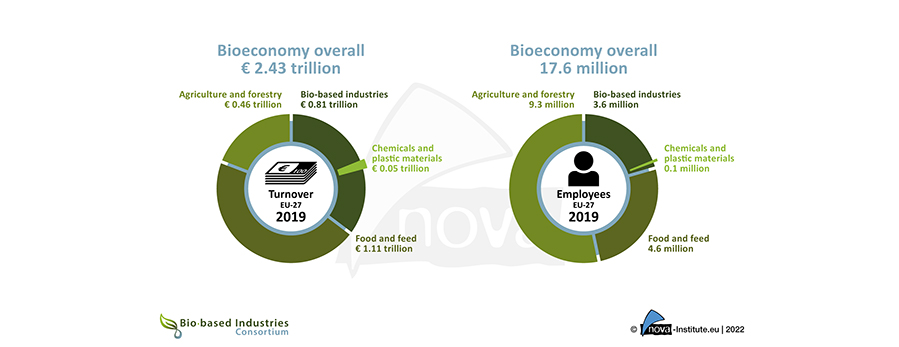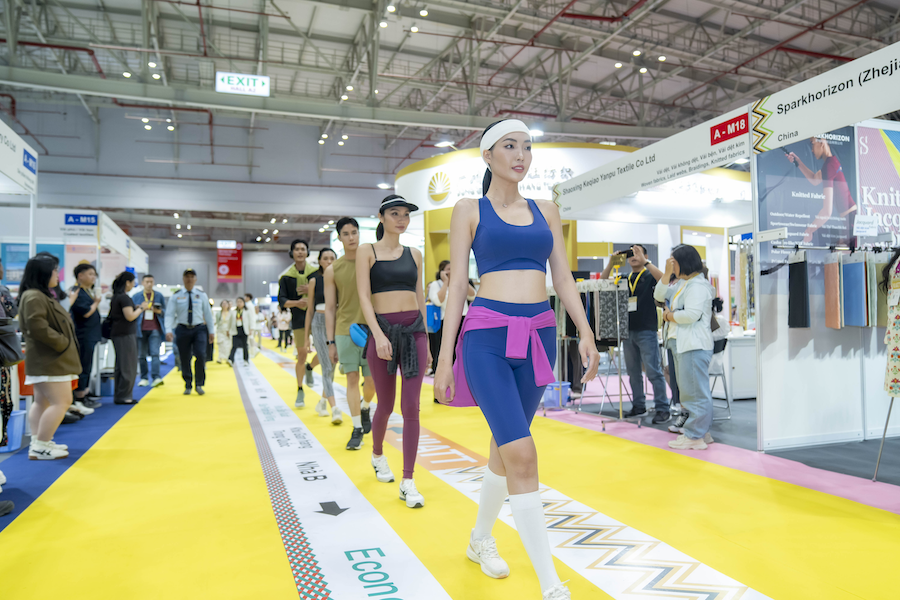#Sustainability
European bio-based industry turnover jumps to 814 billion Euro despite Brexit

This constitutes an increase of 34 billion Euro (+4 %) compared to the year 2018 despite removing the UK from the scope. Analysis of the 2019 Eurostat data show that the turnover of the entire bioeconomy* including food and beverages and the primary sectors of agriculture and forestry, amounts to just over 2.4 trillion Euro in the EU-27.
Published today, “European Bioeconomy in Figures 2008 – 2019” is the 6th in a series of nova- Institute market reports. The initial report was first commissioned by BIC in 2016. The reports demonstrate the macroeconomic effects generated by the bioeconomy, e.g., turnover and employment since 2008.
Even though the latest figures no longer include the UK, the EU’s bioeconomy turnover remained stable, resulting in an increase of around 25 % since 2008 (the earliest data point taken into account in this series of reports).
Bio-based chemical industry generated a turnover of 48 billion Euro in 2019
The 2019 figures for the bio-based chemical industry (including plastics) alone, reveal a turnover of around 48 billion Euro (excluding UK) which depicts a decrease from 2018’s 54 billion Euro (including UK). The respective bio-based share has also been adjusted, resulting in a higher share, from 13.4 % in 2018 to nearly 13.8 % in 2019.
The food and beverage sector accounts for about half of the EU bioeconomy turnover. Meanwhile bio-based industries, such as chemicals and plastics, pharmaceuticals, paper and paper products, forest-based industries, textiles, biofuels and bioenergy account for roughly 30 %, while another 20 % are generated by the primary sectors of agriculture and forestry.
Western and Northern European countries dominate the bio-based economy.
The data also identifies clear differences between groups of member states. For example, the Central and Eastern European countries Poland, Romania and Bulgaria show stronger presence in the lower value-added sectors of the bio-based economy, which create many jobs. This indicates a strong agricultural sector that tends to be labour-intense compared to high value-adding sectors. In comparison, Western and Northern European countries generate a way higher turnover relative to employment, indicating a larger share of refining and value-adding industries. The countries with the highest turnover-to-employment ratios are Finland, Belgium and Sweden. Although the UK is considered a Northern European country with typically a higher amount of value-adding bio-based industries the bio-based share of the chemical sector did not show a decrease following the UK’s removal from the scope. This hints towards a UK chemical sector that does not reach a bio-based share higher than the European mean.
Including the chemical sector’s bio-based share for production volume.
Besides the bio-based share for production value in the chemical sector, this year’s report for the first time includes the chemical secto’s bio-based share for production volume. According to nova’s analysis, the bio-based share of the production volume of the organic part of the chemical sector amounts to 9 % in 2019, increasing from 6.8 % in 2008. These figures confirm the often quoted 10 % share of organic carbon in the chemical sector to be a reasonable estimation. In addition, the bio-based carbon share in the chemical sector is higher than reported by the petrochemical industry.
This novel production volume share aims to provide insights of how much bio-based volume is being produced in the chemical sector. It adds perspective to the information on bio-based turnover generated in the chemical sector expressed by the well-established production value share. Differences in volume and value shares are to a large degree caused by higher bio-based shares in the fine chemical sector, which includes higher value-adding products and respectively lower volumes.
The full report is available free of charge at:
https://renewable-carbon.eu/publications/product/european-bioeconomy-in-figures-2008-2019-pdf/.
*The primary sectors (agriculture, forestry, and fisheries) and the food, beverage, tobacco and paper and paper products can be considered fully bio-based and are thus fully accounted for in the bioeconomy. For other manufacturing sectors such as chemicals, pharmaceuticals and textiles, the bio- based shares were estimated and included in the report’s assessment.
Bio-based Industries Consortium (BIC)
The Bio-based Industries Consortium (BIC) connects industry, academia, regions and citizens to transform bio-based feedstocks into novel sustainable products and applications, and create circular bioeconomy ecosystems through investments, innovation and know-how. Its membership includes 240+ industry members, from primary production to the market, across multiple and diverse sectors, such as agriculture & agri-food, aquaculture & marine, chemicals and materials, including bioplastics, forestry and pulp & paper, market sectors, technology providers and waste management & treatment. BIC’s membership includes over 200 associate members, such as research organisations, academia and trade associations.
BIC is also the private partner in the 2 EUR billion public-private partnership with the EU – the Circular Bio-based Europe Joint Undertaking.
















